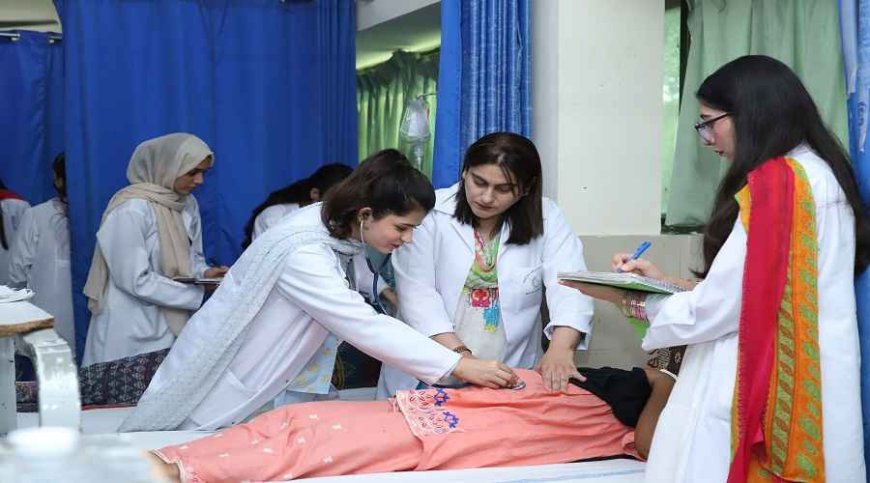Medical residency programs in Pakistan
Medical residency programs in Pakistan are an essential component of the medical education system. They provide postgraduate training

Medical residency programs in Pakistan are an essential component of the medical education system. They provide articalgraduate training to medical graduates and help them acquire practical skills and knowledge necessary to become competent medical practitioners. The medical residency programs in Pakistan are designed to provide hands-on training to doctors, giving them the necessary experience to work independently.
The medical residency programs in Pakistan are governed by the Pakistan Medical and Dental Council (PMDC). The PMDC is the regulatory authority that oversees the medical education system in Pakistan. The PMDC has set standards for medical education in Pakistan, and all medical colleges and residency programs must adhere to these standards.
The medical residency programs in Pakistan are offered in various specialties, such as internal medicine, surgery, pediatrics, gynecology, and many others. The duration of these programs varies from three to five years, depending on the specialty. During this period, residents work under the supervision of experienced medical practitioners and gain practical experience in their respective specialties.
The medical residency programs in Pakistan are highly competitive, and admission is based on merit. The selection criteria vary from program to program, but generally, candidates are required to have completed their medical degrees from recognized institutions and have a good academic record. In addition, candidates are required to pass an entry test and an interview to secure admission.
The medical residency programs in Pakistan are designed to provide a comprehensive learning experience to residents. The programs are structured in such a way that residents get hands-on experience in patient care, diagnosis, and treatment. They also get an opportunity to participate in research activities and attend conferences and workshops to enhance their knowledge and skills.
The medical residency programs in Pakistan are not only beneficial for residents but also for the healthcare system. The residency programs help to bridge the gap between the academic and clinical aspects of medical education. They also help to improve the quality of healthcare by producing competent and skilled medical practitioners.
One of the challenges faced by medical residency programs in Pakistan is the shortage of experienced medical practitioners. Due to this shortage, many residents do not get the necessary supervision and guidance they require during their training. To address this issue, the PMDC has introduced a mentorship program, which pairs residents with experienced medical practitioners who provide guidance and support throughout the residency program.
Another challenge faced by medical residency programs in Pakistan is the lack of funding. Many residency programs are underfunded, which limits their ability to provide the necessary resources and facilities to residents. To address this issue, the government and private sector organizations need to invest more in medical education and provide adequate funding for residency programs.
The medical residency programs in Pakistan also have a significant impact on the overall healthcare system. They help to improve the quality of care provided to patients and contribute to the development of new medical knowledge and practices. Residents who complete their training often go on to work in public and private healthcare institutions, where they play a critical role in providing medical care to patients.
Moreover, the medical residency programs in Pakistan are not limited to Pakistani citizens. International medical graduates can also apply for residency programs in Pakistan, provided they meet the eligibility criteria. This provides an opportunity for foreign medical graduates to gain practical experience in a different healthcare setting and learn about the unique healthcare challenges faced by Pakistan.
Another important aspect of medical residency programs in Pakistan is the research component. Residents are encouraged to participate in research activities and are provided with the necessary resources and facilities to conduct research projects. This not only helps residents to develop research skills but also contributes to the development of new medical knowledge and practices.
Furthermore, medical residency programs in Pakistan also provide an opportunity for residents to specialize in their areas of interest. For example, a resident interested in cardiology can choose to pursue a cardiology fellowship after completing their residency program. This helps residents to acquire advanced knowledge and skills in their areas of interest and become experts in their respective fields.
Finally, medical residency programs in Pakistan also provide an opportunity for residents to develop interpersonal and communication skills. Residents work with patients from diverse backgrounds and learn to communicate effectively with them. This helps residents to develop a patient-centered approach to medical care, where the patient's needs and preferences are taken into consideration.
Medical residency programs in Pakistan are an essential component of the medical education system. They provide practical training to medical graduates and help them acquire the necessary skills and knowledge to become competent medical practitioners. The residency programs are highly competitive, and admission is based on merit. The programs are structured in such a way that residents get hands-on experience in patient care, diagnosis, and treatment. However, there are challenges that need to be addressed, such as the shortage of experienced medical practitioners and the lack of funding. With adequate investment in medical education, these challenges can be overcome, and the medical residency programs in Pakistan can continue to produce competent and skilled medical practitioners who can contribute to the improvement of the healthcare system.
